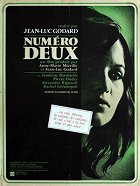Directed by:
Jean-Luc GodardScreenplay:
Jean-Luc GodardCinematography:
William LubtchanskyComposer:
Léo FerréPlots(1)
The film was supposed to be called Breathless II, and it opens a radically new, less political stage in Godard's work. It is a story of three generations. A young couple - politically militant Pierre and Sandrine, who is tired with love - raises two small children and lives with the grand-parents. The grandpa reminisces about the Comintern and the grandmother runs the household. They all deal with the issues of sex, politics and their own lives at the same time. (Summer Film School)
(more)Reviews (1)
"What shadow, what person, there, behind the image, pushes or pulls the image; which worker outside the frame pushes or pulls the camera trolley?" Marcel Hanoun asks in his book “Cinéma cinéaste, Notes sur l’image écrite,” p. 72, from 2001, symptomatically a director of an art ghetto outside the ideological mainstream, a director who never experienced ideological frenzy like Godard, only artistic frenzy... How is it possible that a former Maoist (1974) resonated with a slowly dying art lover (2001)? Because not only Cinematic Marxism, but every true art always grasps itself as a creator; the simultaneity of its identity and the process of its creation; the consciousness of its unconsciousness = its conditions of emergence, whether productive or creative. Only then are scientific theories and philosophies born, which do not forget the world, and works of art that do not force us to forget about life. Is this film therefore standing on the gradual border between Godard's Cinematic Marxism and his late poetry on the film image, as he did from the late 70s until his death, similarly to the early "film" Godard of the 60s being somewhat in contrast to the "talkative" Godard of his audiovisual essays? This is just another example of the fallacy of thinking in simple temporal boxes, which thinking about cinematography and art filmology often satisfies: we can, on the other hand, agree with Hanoun that "there is nothing between camera writing and film reading other than the continuity of perspective." Similarly, the view of all of Godard's "periods" will have to reveal them as the continuity of one movement of an emerging and self-perpetuating truly artistic film - this view will be difficult, as it will already belong to the prolegomena of any future film metaphysics that may become a science. This is because the current era, where the conformism of the hegemonic bourgeois ideology blinds viewers, viewers who do not understand how it is possible in nature and in the only possible nature - because it is artificially created by the director... - to connect film, sociology, reflection on the essence of film in relation to image and sound, video, childbirth, poverty, France, the world, voice and thought with reflections on the birth of the film we are currently watching ("there will always be a blind female soldier shooting at the light," p. 77)... because this current era is not the future era, the one that will already understand for itself that every true art is at the same time "Marxist!" And that is why Godard and Hanoun could agree: "The image sneaks in through the gap of sleep" (p. 72). Sleep that awakens the unconsciousness, which awakens dreams, which awakens imagination, to which we must give all power so that films like Godard's can be created, which people of today don't want to understand, or films like Hanoun's, which often couldn't even be made due to lack of resources, and therefore didn't have to be immediately misunderstood...
()
